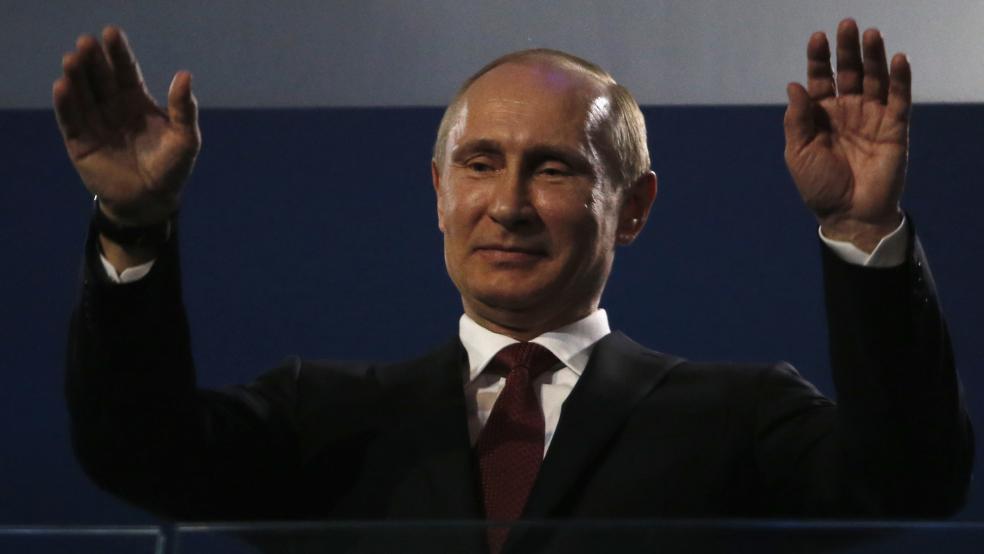Russia President Vladimir Putin implemented retaliatory sanctions against the west today, limiting the import of some food, agriculture and raw materials. But the penalties were a sideshow compared to the main event along Ukraine’s border.
NATO says Russia has amassed some 20,000 troops. In May, Putin had removed Russian troops at the border in what many in the international community thought was a sign of good faith. But now, after the United States and Europe issued the toughest economic sanctions against Moscow since the Cold War, the troops are back.
Related: Putin’s Choice: Cut a Face-Saving Deal or Become a Pariah
At the same time, Putin has requested an emergency meeting of the UN Security Council to address what Russian officials are calling a humanitarian crisis.
“We are convening an emergency meeting of the United Nations Security Council on the humanitarian situation in Ukraine,” Russia’s UN Ambassador Vitaly Churkin said Tuesday. The Russian Foreign Ministry then added that the United Nations and the International Committee for the Red Cross “confirmed that they shared concerns about grave humanitarian effects from Kiev’s military operation in the southeast of Ukraine, and on the whole welcomed our initiatives and expressed readiness to join discussion on the deployment of a humanitarian mission.”
This situation is straight out of the KGB’s old playbook, a book that Putin, a former KGB spy, knows well. After he created a fake reason to annex Crimea, he began to fan the flames of conflict across Eastern Ukraine. With the so-called “humanitarian crisis,” he has now created the pretext for an invasion to stop it.
In other words, Putin has just created a reason, albeit a bogus one, to invade Ukraine.
Related: Russian Oligarchs Are Tired of Funding Putin’s Land Grab
Both NATO and the United States take the threat of invasion so seriously that they issued separate warnings.
“We’re not going to guess what’s on Russia’s mind, but we can see what Russia is doing on the ground – and that is of great concern. Russia has amassed around 20,000 combat-ready troops on Ukraine’s eastern border,” Oana Lungescu, a NATO spokesperson, said Wednesday.
“When you see the buildup of these troops, the sophistication and training of these troops, the heavy military equipment that’s being put on the border, of course it’s a reality and it’s a possibility,” Defense Secretary Chuck Hagel added during a visit to an American military base in Stuttgart.
What’s to Gain?
The question on everyone’s mind is what Putin has to gain by invading Ukraine. Eastern Ukraine is not especially rich with natural resources, although the country does have some of the deepest coalmines in Europe. As the coverage of the downing of Malaysian Airlines Flight 17 showed, that part of Ukraine does not have sophisticated infrastructure or industry.
Related: EU Agrees to Russia Sanctions; US Could Arm Ukraine
As Vladislav Inozemtsev, director of the Centre for Post-Industrial Studies in Moscow and a visiting fellow at the Center for Strategic and International Studies, argued in March, taking Eastern Ukraine would actually hurt Russia. It would force Moscow to pay billions in subsidies to regional governments that are currently covered by Kiev.
“In seeking Ukraine’s eastern regions, Russia is fighting for an unjust cause in political terms — and a wrong one in economic terms. Lenin wrote that politics is the most concentrated expression of economics,” Inozemtsev wrote. “If Vladimir Putin were to heed Lenin, he would see that integrating eastern Ukraine and Crimea into Russia, or their emergence as quasi-autonomous client states, would cost Moscow tens of billions each year in subsidies and create competition with Russian metal-processing, chemical, tourist and other businesses.”
At the same time Putin would become even more isolated from the international community. His aggression would also likely lead European countries, which are spending less on defense, to reevaluate these decisions.
Edward Goldberg, a professor at Baruch College and the New York University Center for Global Affairs, said nothing has changed since March. By every standard of rational interests, invading Ukraine is a mistake for Moscow.
Related: Russia, U.S. Edge Toward Economic Warfare
“Even if he gets Eastern Ukraine, what has he won?” Goldberg asked. “He will have pushed western Ukraine into the arms of the EU. He will have brought NATO back to life. He will have re-invigorated Germany as a power -- the major thing Russia has feared since the end of World War II -- and he will restart the debate of exporting American energy to the EU, something he does not want to happen.”
A Man of Mystery
Putin’s seemingly irrational behavior is what makes confronting this situation so difficult to do. DOD officials have admitted to The New York Times that they simply don’t know what he’s going to do next.
“[S]hould Putin decide [to invade Ukraine], he could do that with little or no notice. We just don’t know what he’s thinking,” a senior DOD official told The Times.
All of this lends credence to an observation made by German Chancellor Angela Merkel at the start of this crisis.
“As Angela Merkel implied this spring, Putin is in another world,” Goldberg said. “His strategy has shown a total lack of understanding of today's globalized world. Grievances and believing that Russia still has a historic need for buffer states have distorted his reality to the point where his actions have hurt Russia's long term interests.”
“Putin's running out of space in terms of decision-making,” Goldberg continued. “By fanning a political frenzy in Russian media over Ukraine with bizarre implication and outright lies not seen since Goebbels times such as the Ukrainians crucifying children he has boxed himself in politically… Putin could be fighting for his presidency and his life.”
Top Reads from The Fiscal Times





